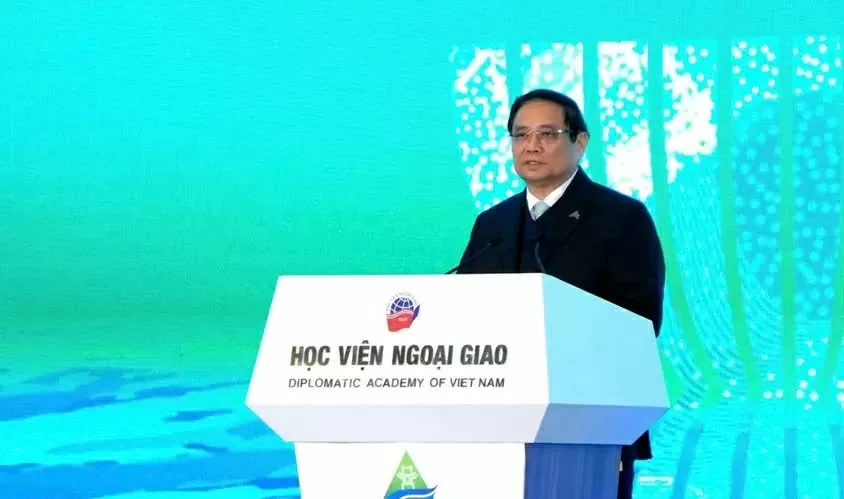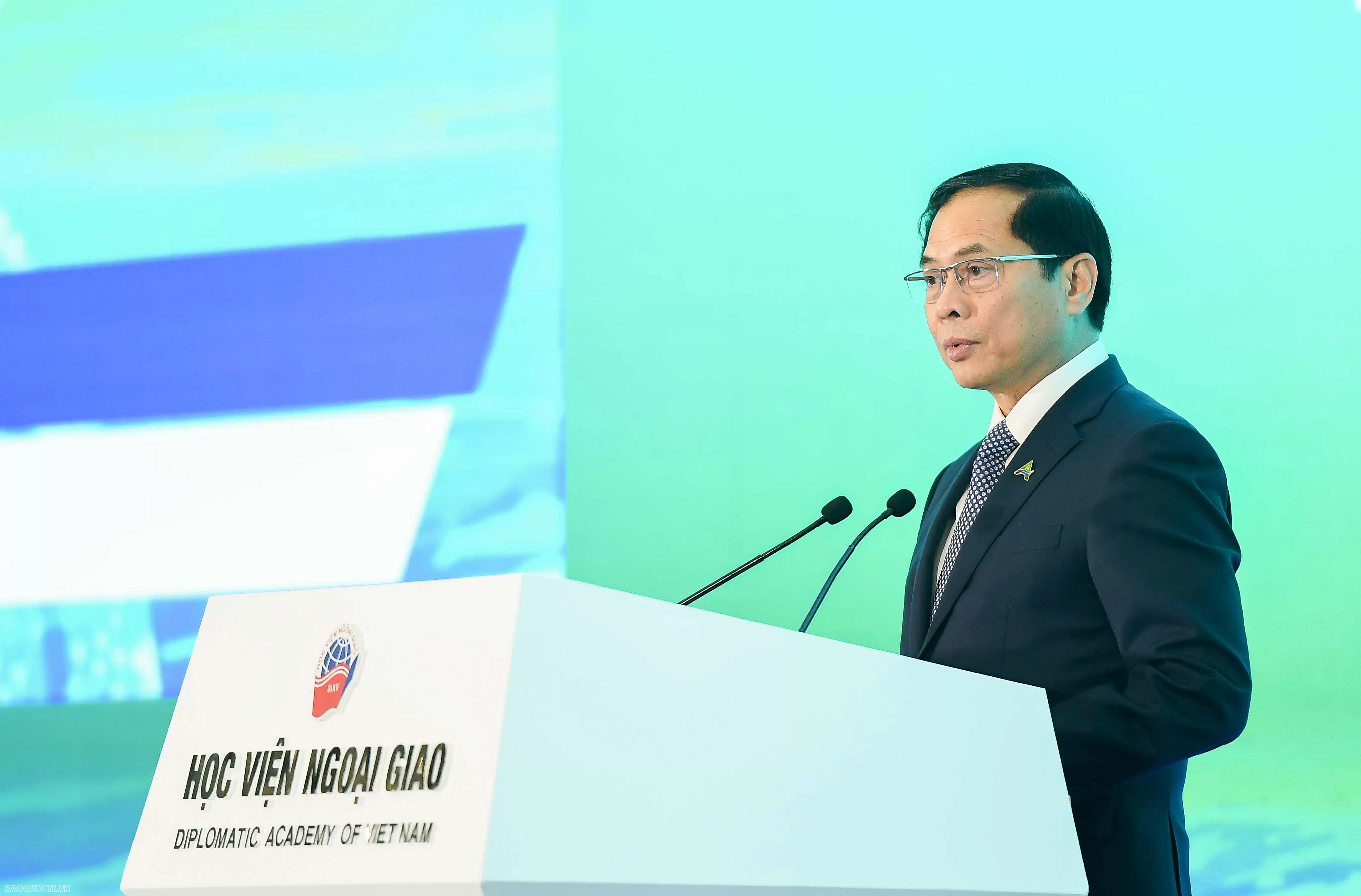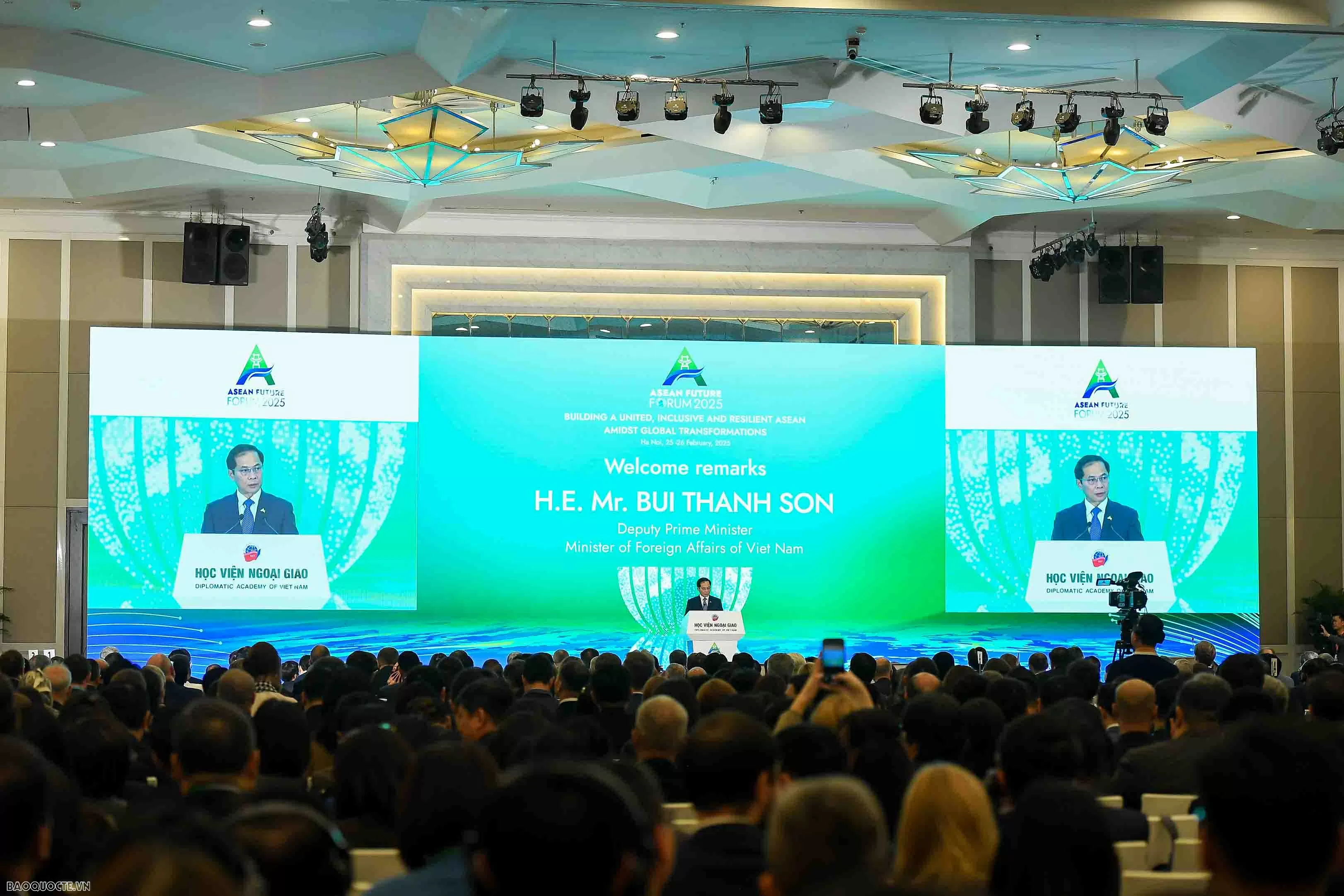
ASEAN Future Forum 2025 opens in Hanoi
Latest
 |
| Prime Minister Pham Minh Chinh delivers remarks at the Opening Session of the ASEAN Future Forum 2025 in Hanoi on February 25. 2025. (Photo: Hoang Long) |
Attending the opening session were Prime Minister Pham Minh Chinh, President of Timor-Leste Jose Ramos-Horta, Head of the Central Commission for Propaganda and Education, Director of the Ho Chi Minh National Academy of Politics Nguyen Xuan Thang; Deputy Prime Minister and Minister of Foreign Affairs Bui Thanh Son; Minister of Public Security Luong Tam Quang, ASEAN Secretary-General Kao Kim Hourn along with leaders from ASEAN countries, ministries, sectors, localities, and businesses.
Incubator of innovative ideas for ASEAN’s future development
In his opening remarks at the Forum, Deputy Prime Minister and Minister of Foreign Affairs Bui Thanh Son emphasized that the ASEAN Future Forum was inaugurated last year as an open, inclusive, Track 1.5 avenue “of ASEAN, by ASEAN, and for ASEAN,” aiming to complement ASEAN’s existing frameworks by fostering discussions with fresh, innovative and strategic insights. The goal is to make the Forum a value added platform that can help shape ASEAN's future in a manner that best serves its interests. The Deputy Prime Minister expressed his delight to see that the first ASEAN Future Forum in 2024 was a resounding success and his hope that with increasing interest and active participation, as reflected by both the level of participation and the size of the event today, ASEAN Future Forum will grow into a regular platform and a premier incubator of innovative ideas for ASEAN’s future development.
 |
| Deputy Prime Minister and Minister of Foreign Affairs Bui Thanh Son speaks at the forum. (Photo: Nguyen Hong) |
According to Deputy Prime Minister Son, this year marks a significant milestone for ASEAN, as it completes the ASEAN Community Vision 2025 and is about to adopt the ASEAN Community Vision 2045. Over the last six decades, ASEAN has undergone profound transformations to become a dynamic Community of 10 member states with over 650 million people and the world’s fifth largest economy. ASEAN has also established itself as the gravity of economic and security architectures in the Indo-Pacific.
However, Deputy Prime Minister Son also expressed concern over the rapid developments in global geopolitics over the past few weeks. "These high-stake events suggest the world is at a critical juncture, raising numerous unanswered questions about the future interactions among major powers and the post-World War II international system, particularly the roles and functions of the UN Charter and international law", he noted.
In this context, it's crucial for regional organizations like ASEAN to demonstrate their relevance and agency in ensuring the resilience and sustainability of established rules and norms. It’s also crucial for ASEAN to maintain its unity, resilience and inclusiveness in face of new unfolding realities, the Deputy Prime Minister stressed.
And that’s why ASEAN Future Forum this year is themed "Building a United, Inclusive and Resilient ASEAN amidst Global Transformations."
Unity, Inclusiveness, and Resilience
In his elaboration, Deputy Prime Minister Son said that while unity speaks to ASEAN’s greatest strength, resilience is a call to action, reflecting ASEAN’s ability to navigate through global uncertainties and possible external shocks. Inclusiveness ensures that ASEAN’s progress is equitable, and no member state or group is left behind. It also means ASEAN will not take side, but befriend and partner with all and serve as a bridge for dialogues and cooperation for all parties. "I believe unity, inclusiveness, and resilience will help ASEAN navigate through today’s complex global landscape", the Deputy Prime Minister affirmed.
 |
| Overview of the Opening Session of the ASEAN Future Forum 2025. (Photo: Hoang Long) |
On that note, Deputy Prime Minister Son expressed his hope that today and tomorrow, participants will have in-depth discussions on key questionsl, including:
What mega trends are shaping ASEAN? It is necessary to thoroughly understand how multipolarization and shifting regional and global dynamics will impact ASEAN, as well as how emerging trends such as deglobalization or reglobalization, along with other non-traditional challenges, will shape the future of the region and beyond.
What are the greatest opportunities and challenges for ASEAN? These arise not only from global and regional geopolitical and economic transformations but also from within ASEAN itself.
How can ASEAN foster unity, inclusivity, and resilience? Are these goals and values still essential to maintain and promote, to make sure ASEAN responsive enough to geostrategic and economic shifts?
How will cutting-edge technologies impact ASEAN? Emerging technologies such as artificial intelligence, quantum computing, and other breakthroughs are fostering unprecedented growth but also pose significant challenges for management in terms of ethics, safety, and cybersecurity.
Lastly but most importantly, how can ASEAN sustain its Centrality in a rapidly evolving world? What strategies should ASEAN to maintain its convening power and its role in facilitating dialogue and preventing miscalculations and misunderstanding among major powers, and thus contributing effectively to regional peace and stability?
Answers to those questions as well as ideas and recommendations made over the next two days will be valuable for not only ASEAN’s deliberations this year under Malaysia’s Chairmanship but also important to ASEAN’s path in the years ahead, Deputy Prime Minister Son emphasized.













